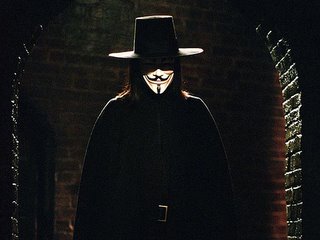V for Vendetta
 My wife and I subjected ourselves to this film last weekend, and it was . . . mixed. The ideas presented sparked some fun discussion for us, and the action was entertaining, but the homosexual propaganda I could have done without.
My wife and I subjected ourselves to this film last weekend, and it was . . . mixed. The ideas presented sparked some fun discussion for us, and the action was entertaining, but the homosexual propaganda I could have done without.I don't think it is necessary to glorify the homosexual lifestyle in order to communicate the idea that we have a duty to love all human beings, including those with homosexual inclinations. Singling out two gay people as "victims" of a ruthless, oppressive, facist regime does little to deepen my sympathies.
On top of that, the film had a marked anti-church bias, portraying priests and religious jargon as nothing more than tools in the hands of a manaical dictator.
Besides that, I loved the film.
I could tell you what I thought was the most fascinating segment of the story, but it would ruin it for you.


1 Comments:
Hi Chris, i am excited to learn that you watched this film, although i guess i understood some of the content a little different than you did.
I understand your aversion to using emotionally charged movie scenes for pushing an agenda. That being said, i am sure that you would agree that if we as Christians go to movies made by non-christians, we should expect such things to happen. That being the case, i try to view such scenes from a different, and hopefully, more productive angle.
I am not surprised by the glorification of the homosexual lifestyle, so i try to view such scenes from more of a "detective perspective." When i watch scenes like the one you mentioned, i try to see what, if any, truth there is in what the film is portraying.
I try to ask myself honest questions like the following: "Is there any truth in the idea that sexually immoral people have been treated harshly by the Church? Does this still happen today?" Getting closer to the bone, i ask "is this is something i have been, or still am guilty of doing in my life? What should i do about it?"
Viewed in this light, this scene takes on a new meaning for me (although i understand that this was not the director's original intent), one that i hope will spur me on to a life of greater pursuit of godliness.
This is my basic approach to anything "secular." I want to go beyond understanding the thought, intention, and underlying worldview of secular media to looking for what truth can be gleaned from it and how can it be used to further my walk with Christ. In doing so i hope to avoid the secular-sacred divide.
So i guess i would say that scenes like that challenge me, not just frustrate me. I agree that it is not "necessary" to glorify such a lifestyle to communicate truth, but it doesn't that it can't. I think we can learn alot from such perspectives. This is the way they (unbelievers) have communicated their perspectives regarding the church, and i think that we should try to enter their worlds, so to speak. My perspective regarding the anti-church rhetoric was handled in the same way. It is hard to deny the fact that the film's portrayal of religion has at times been pretty accurate. The question to me is not whether it is unfair to brand all Christians today as being that way (it is), but what can we do to as a believing community to change this perception?
Incidentally, i am not sure why you put "victims" in quotations; homosexual, agnostic, pr Christian theist, getting kidnapped, tortured and killed makes them victims of ungodly treatment; i am not sure i understand your intent here. Could you help me out please?
I hope my ideas here were communicated clearly (i am not endorsing their intended message!). I hope to hear what your favorite segment of the story was. Finally, please accept these comments in the spirit that i am sending them; as humbly as can be mustered. Take care,
Derek
Post a Comment
<< Home